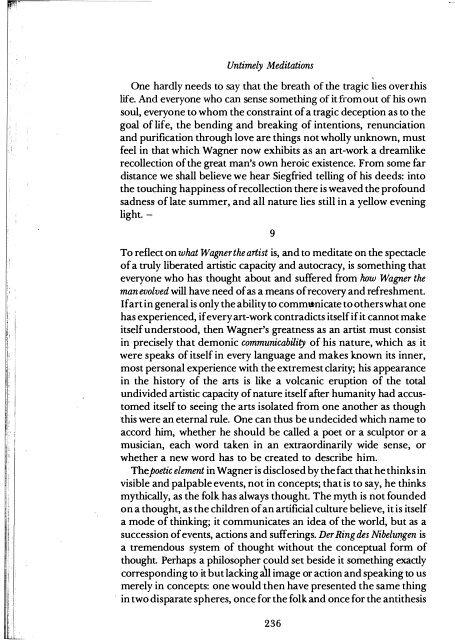Friedrich_Nietzsche - Untimely_Meditations_(Cambridge_Texts_in_the_History_of_Philosophy__1997)
Friedrich_Nietzsche - Untimely_Meditations_(Cambridge_Texts_in_the_History_of_Philosophy__1997)
Friedrich_Nietzsche - Untimely_Meditations_(Cambridge_Texts_in_the_History_of_Philosophy__1997)
You also want an ePaper? Increase the reach of your titles
YUMPU automatically turns print PDFs into web optimized ePapers that Google loves.
<strong>Untimely</strong> <strong>Meditations</strong>One hardly needs to say that <strong>the</strong> breath <strong>of</strong> <strong>the</strong> tragic lies over thislife. And everyone who can sense someth<strong>in</strong>g <strong>of</strong> it from out <strong>of</strong> his ownsoul, everyone to whom <strong>the</strong> constra<strong>in</strong>t <strong>of</strong> a tragic deception as to <strong>the</strong>goal <strong>of</strong> life, <strong>the</strong> bend<strong>in</strong>g and break<strong>in</strong>g <strong>of</strong> <strong>in</strong>tentions, renunciationand purification through love are th<strong>in</strong>gs not wholly unknown, mustfeel <strong>in</strong> that which Wagner now exhibits as an art-work a dreamlikerecollection <strong>of</strong> <strong>the</strong> great man's own heroic existence. From some fardistance we shall believe we hear Siegfried tell<strong>in</strong>g <strong>of</strong> his deeds: <strong>in</strong>to<strong>the</strong> touch<strong>in</strong>g happ<strong>in</strong>ess <strong>of</strong> recollection <strong>the</strong>re is weaved <strong>the</strong> pr<strong>of</strong>oundsadness <strong>of</strong> late summer, and all nature lies still <strong>in</strong> a yellow even<strong>in</strong>glight. -9To reflect on what Wagner <strong>the</strong> artist is, and to meditate on <strong>the</strong> spectacle<strong>of</strong> a truly liberated artistic capacity and autocracy, is someth<strong>in</strong>g thateveryone who has thought about and suffered from Iww Wagner <strong>the</strong>man evolved will have need <strong>of</strong> as a means <strong>of</strong> recovery and refreshment.If art <strong>in</strong> general is only <strong>the</strong> ability to comm1tnicate to o<strong>the</strong>rs what onehas experienced, if every art-work contradicts itself if it cannot makeitself understood, <strong>the</strong>n Wagner's greatness as an artist must consist<strong>in</strong> precisely that demonic communicability <strong>of</strong> his nature, which as itwere speaks <strong>of</strong> itself <strong>in</strong> every language and makes known its <strong>in</strong>ner,most personal experience with <strong>the</strong> extremest clarity; his appearance<strong>in</strong> <strong>the</strong> history <strong>of</strong> <strong>the</strong> arts is like a volcanic eruption <strong>of</strong> <strong>the</strong> totalundivided artistic capacity <strong>of</strong> nature itself after humanity had accustomeditself to see<strong>in</strong>g <strong>the</strong> arts isolated from one ano<strong>the</strong>r as thoughthis were an eternal rule. One can thus be undecided which name toaccord him, whe<strong>the</strong>r he should be called a poet or a sculptor or amusician, each word taken <strong>in</strong> an extraord<strong>in</strong>arily wide sense, orwhe<strong>the</strong>r a new word has to be created to describe him.Thepoetic element <strong>in</strong> Wagner is disclosed by <strong>the</strong> fact that he th<strong>in</strong>ks <strong>in</strong>visible and palpable events, not <strong>in</strong> concepts; that is to say, he th<strong>in</strong>ksmythically, as <strong>the</strong> folk has always thought. The myth is not foundedon a thought, as <strong>the</strong> children <strong>of</strong> an artificial culture believe, it is itselfa mode <strong>of</strong> th<strong>in</strong>k<strong>in</strong>g; it communicates an idea <strong>of</strong> <strong>the</strong> world, but as asuccession <strong>of</strong> events, actions and suffer<strong>in</strong>gs. Der R<strong>in</strong>g des Nibeluf!gen isa tremendous system <strong>of</strong> thought without <strong>the</strong> conceptual form <strong>of</strong>thought. Perhaps a philosopher could set beside it someth<strong>in</strong>g exactlycorrespond<strong>in</strong>g to it but lack<strong>in</strong>g <strong>in</strong> image or action and speak<strong>in</strong>g to usmerely <strong>in</strong> concepts: one would <strong>the</strong>n have presented <strong>the</strong> same th<strong>in</strong>g<strong>in</strong> two disparate spheres, once for <strong>the</strong> folk and once for <strong>the</strong> anti<strong>the</strong>sis236


